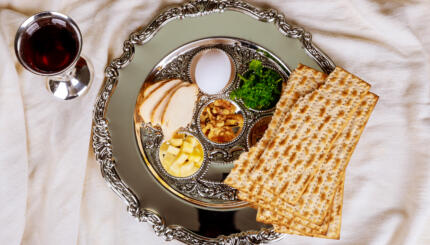Just as shunning hametz [leaven] is the symbolic statement of leaving slavery behind, so is eating matzah the classic expression of entering freedom.
Matzah was the food the Israelites took with them on the Exodus. “They baked the dough that they took out of Egypt into unleavened cakes [matzot], for it was not leavened, since they were driven out of Egypt and could not delay; nor had they prepared provisions for themselves” (Exodus 12:39). According to this passage, matzah is the hard bread that Jews initially ate in the desert because they plunged into liberty without delaying.
However, matzah carries a more complex message than “Freedom now!” Made only of flour and water–with no shortening, yeast, or enriching ingredients–matzah recreates the hard “bread of affliction” (Deuteronomy 16:3) and meager food given to the Hebrews in Egypt by their exploitative masters. Like the bitter herbs eaten at the seder, it represents the degradation and suffering of the Israelites.
Bread of Slavery, Bread of Freedom
Matzah is, therefore, both the bread of freedom and the erstwhile bread of slavery. It is not unusual for ex-slaves to invert the very symbols of slavery to express their rejection of the masters’ values. But there is a deeper meaning in the double-edged symbolism of matzah. It would have been easy to set up a stark dichotomy: matzah is the bread of the Exodus way, the bread of freedom; hametz is the bread eaten in the house of bondage, in Egypt. Or vice versa: matzah is the hard ration, slave food; hametz is the rich, soft food to which free people treat themselves. That either/or would be too simplistic. Freedom is in the psyche, not in the bread.
With your help, My Jewish Learning can provide endless opportunities for learning, connection and discovery.
The halakha [Jewish law] underscores the identity of hametz and matzah with the legal requirement that matzah can be made only out of grains that can become hametz–that is, those grains that ferment if mixed with water and allowed to stand. How the human prepares the dough is what decides whether it becomes hametz or matzah. How you view the matzah is what decides whether it is the bread of liberty or of servitude.
The point is subtle but essential. To be fully realized, an Exodus must include an inner voyage, not just a march on the road out of Egypt. The difference between slavery and freedom is not that slaves endure hard conditions while free people enjoy ease. The bread remained equally hard in both states, but the psychology of the Israelites shifted totally. When the hard crust was given to them by tyrannical masters, the matzah they ate in passivity was the bread of slavery. But when the Jews willingly went from green fertile deltas into the desert because they were determined to be free, when they refused to delay freedom and opted to eat unleavened bread rather than wait for it to rise, the hard crust became the bread of freedom. Out of fear and lack of responsibility, the slave accommodates to ill treatment. Out of dignity and determination to live free, the individual will shoulder any burden.
Stressing the Goodness
The great Levi Yitzchak of Berditchev, whose analyses always portrayed the people of Israel in a favorable light, insisted that the willingness of the Israelites to enter the desert with hard bread continues to evoke God’s love. Levi Yitzchak asked: Why does the Torah continually call Passover hag hamatzot–the feast of unleavened bread–while the Jews call it hag haPesach–the feast of Passover? Because as lovers they stress each other’s goodness. Israel praises God who passed over the homes of the Jews when destroying Egypt. God praises the Jews who went so trustingly out of the fertile plain of Egypt into a barren desert with meager food.
Tradition specifically requires eating unleavened bread on the first two nights of Passover. (Dieters will be happy to learn that during the rest of the holiday the only requirement is not to eat hametz.) Eating hard bread during the holiday of liberation stimulates appreciation for the flavor of freedom and summons up empathy for those still in need. At the seder, the Exodus retelling opens with the phrase, “This is the bread of affliction that our fathers ate in Egypt.”
The moral consequence follows immediately, “Let all who are hungry enter and eat; let all who are in need come and join in the Passover with us. This year [we are] slaves. Next year [may the slaves be] free.” The hard crust commands us to help the poor, the stranger, the outsider.
Reprinted with permission of the author from The Jewish Way: Living the Holidays.
hametz
Pronounced: khah-METZ or KHUH-metz, Origin: Hebrew, bread or any food that has been leavened or contains a leavening agent. Hametz is prohibited on Passover.
Torah
Pronunced: TORE-uh, Origin: Hebrew, the Five Books of Moses.


